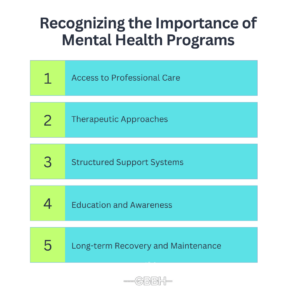Bipolar disorder is a complex and often misunderstood mental health condition characterized by extreme mood swings that can significantly impact a person’s life and relationships. These mood swings include periods of mania or hypomania (highs) and episodes of depression (lows). Supporting a loved one living with bipolar disorder requires understanding, patience, and effective strategies to help them navigate their emotional landscape. This guide offers insights into bipolar disorder, practical support strategies, and the mental health resources available at Greater Boston Behavioral Health.
Understanding Bipolar Disorder
Before offering support to your loved one, it’s crucial to understand what bipolar disorder entails. During manic phases, individuals might experience heightened energy, euphoria, or become unusually irritable. They might take risks they wouldn’t usually take, such as spending large amounts of money or engaging in dangerous activities. On the other hand, depressive episodes can leave them feeling hopeless, fatigued, or unable to concentrate.
Bipolar disorder is categorized into several types, each with distinct patterns of mood changes:
- Bipolar I Disorder: Characterized by manic episodes lasting at least seven days, this type often includes depressive episodes that last at least two weeks. The manic episodes can be severe, leading to significant impairment in daily functioning.
- Bipolar II Disorder: This type involves a pattern of depressive episodes and hypomanic episodes (a milder form of mania) but does not include full-blown manic episodes. Individuals may experience significant mood changes, but they may still function reasonably well between episodes.
- Cyclothymic Disorder: Cyclothymia involves numerous periods of hypomanic symptoms and depressive symptoms lasting for at least two years (one year in children and adolescents). The symptoms are less severe than those of Bipolar I or II but can still affect daily life.
- Other Specified and Unspecified Bipolar and Related Disorders: This category includes bipolar disorder symptoms that do not match the three categories listed above.
These mood swings can disrupt daily life, making it difficult to maintain relationships, hold down a job, or complete everyday tasks.
Signs and Symptoms
Recognizing the signs and symptoms of bipolar disorder is crucial for effective support. Common indicators include:
- Manic Episodes: Symptoms may include elevated mood, increased energy, decreased need for sleep, racing thoughts, rapid speech, inflated self-esteem, distractibility, and impulsive or reckless behavior (such as spending sprees or risky sexual encounters).
- Hypomanic Episodes: Similar to mania but less severe, these episodes may not cause significant impairment in daily functioning. Individuals may feel highly productive and social, but these moods can also shift unexpectedly.
- Depressive Episodes: Characterized by persistent sadness, loss of interest in activities, changes in appetite and sleep patterns, fatigue, feelings of worthlessness or guilt, and difficulty concentrating. In severe cases, suicidal thoughts or behaviors may occur.
Recognizing the Importance of Mental Health Programs
One of the most effective ways to help a loved one with bipolar disorder is to connect them with mental health programs. These programs are designed to provide individuals with the tools and resources they need to manage their condition. From counseling to group therapy sessions, these programs focus on equipping patients with coping strategies and providing a support network that can make a significant difference in their mental health journey.
If you’re in Massachusetts, you can explore a mental health treatment center in Massachusetts that specializes in bipolar disorder. These centers often offer a wide range of services, from outpatient therapy to more intensive care options, ensuring that individuals receive the level of care that best suits their needs.
Supporting a Loved One with Bipolar Disorder
Supporting someone with bipolar disorder can be emotionally challenging but also incredibly rewarding. Here are effective strategies to provide meaningful support:
1. Educate Yourself About Bipolar Disorder
Understanding the complexities of bipolar disorder is essential. Research the symptoms, treatment options, and coping strategies associated with the disorder. Familiarizing yourself with terminology and treatment approaches, such as Cognitive-Behavioral Therapy (CBT) and Dialectical Behavior Therapy (DBT), will help you engage in informed discussions with your loved one.
2. Encourage Professional Treatment
Encourage your loved one to seek help from mental health professionals. Treatment for bipolar disorder often includes a combination of medication and therapy. At Greater Boston Behavioral Health, we offer comprehensive Mental Health Programs that include:
- Cognitive-Behavioral Therapy (CBT): This therapy helps individuals identify and change negative thought patterns, develop coping skills, and manage stressors effectively.
- Dialectical Behavior Therapy (DBT): Particularly effective for emotional regulation, DBT combines cognitive-behavioral techniques with mindfulness practices to help individuals manage their emotions and improve interpersonal relationships.
- Intensive Outpatient Program (IOP): This program provides structured support while allowing individuals to maintain their daily responsibilities, ideal for those needing more intensive treatment without 24-hour care.
- Partial Hospitalization Program (PHP): PHP offers a higher level of care for those requiring daily support, helping individuals transition from inpatient treatment to outpatient care.
3. Practice Active Listening and Empathy
Encourage open communication by being an active listener. Allow your loved one to express their feelings without interruption or judgment. Validate their emotions and experiences by showing empathy, which can help them feel understood and less isolated.
4. Be Patient and Flexible
Mood swings can be unpredictable, making it crucial to remain patient and adaptable. Understand that your loved one may not always be able to control their emotions or reactions, especially during intense manic or depressive episodes. Your support during these times can be invaluable.
5. Help Create a Structured Routine
Routines can provide stability and predictability, which are particularly beneficial for individuals with bipolar disorder. Help your loved one establish a daily routine that includes regular sleep, meals, exercise, and time for relaxation. This structure can help reduce stress and improve mood stability.
6. Encourage Self-Care Practices
Encourage your loved one to engage in self-care activities that promote physical and emotional well-being. This may include:
-
- Physical Activity: Regular exercise can improve mood and reduce anxiety.
- Mindfulness and Relaxation Techniques: Practices such as yoga, meditation, or deep-breathing exercises can help manage stress and enhance emotional regulation.
- Hobbies and Interests: Encourage them to engage in activities they enjoy, as these can provide a sense of accomplishment and joy.
7. Take Care of Yourself
Supporting someone with bipolar disorder can be emotionally taxing. It’s essential to prioritize your own mental health by setting boundaries, seeking support for yourself, and engaging in self-care activities. Consider joining support groups or seeking therapy for yourself, where you can share your experiences and learn from others in similar situations.
Encouraging Therapy
Therapy plays a critical role in managing bipolar disorder, and there are several forms of therapy that have been proven effective. Here are two common forms of therapy used in treating bipolar disorder:
Cognitive-behavioral therapy (CBT)
Cognitive-behavioral therapy (CBT) is one of the most widely used methods in managing bipolar disorder. CBT helps individuals identify negative thought patterns and behaviors, guiding them toward more positive and realistic thinking. For people with bipolar disorder, CBT can teach them how to recognize triggers for their mood swings and develop strategies to prevent or reduce the severity of manic or depressive episodes. Encouraging your loved one to explore CBT can be a powerful step toward managing their condition.
Dialectical behavior therapy (DBT)
Another therapy commonly used for bipolar disorder is dialectical behavior therapy (DBT). DBT combines mindfulness practices with strategies for regulating emotions, tolerating distress, and improving relationships. Individuals with bipolar disorder can benefit from DBT by learning how to manage intense emotions and navigate interpersonal relationships, which can often be strained during mood episodes.
Final Thoughts
Supporting someone living with bipolar disorder can be challenging, but it’s also incredibly rewarding. By connecting them with the right resources, including mental health programs and therapy options like cognitive-behavioral therapy or dialectical behavior therapy, you can make a significant difference in their life. With your help, your loved one can navigate the complexities of bipolar disorder and lead a more balanced, fulfilling life.
If you or your loved one need more support, don’t hesitate to explore a mental health treatment center in Massachusetts or local resources that can provide the care and guidance needed to manage bipolar disorder effectively.
Additionally, it’s important to remember to take care of your own mental health while supporting someone with bipolar disorder. Caregiver fatigue and emotional burnout are real concerns, especially when you’re invested in the well-being of a loved one. Make sure to establish boundaries, seek support from friends, family, or a support group, and take time for self-care. By maintaining your own mental wellness, you’ll be better equipped to provide meaningful and sustainable support for your loved one, creating a healthier dynamic for both of you. Call us at (888)278-0716 today to learn more about our services and how we can help you on your journey to recovery!
FAQ on Living with Bipolar Disorder
How can I support a loved one with bipolar disorder?
Supporting a loved one involves educating yourself about the disorder, encouraging professional treatment, practicing active listening, being patient, helping create a structured routine, promoting self-care, and taking care of your own mental health.
What types of therapy are effective for bipolar disorder?
Cognitive-behavioral therapy (CBT) and dialectical behavior therapy (DBT) are effective therapeutic approaches for managing bipolar disorder. They focus on helping individuals identify and change negative thought patterns and develop coping strategies.
When should I seek help for my loved one?
If your loved one experiences severe mood swings, thoughts of self-harm, or engages in risky behavior, it’s crucial to seek professional help immediately. Encourage them to contact a mental health professional or a mental health treatment center.
What resources are available for individuals with bipolar disorder?
Resources include mental health treatment centers, support groups, and therapy programs such as intensive outpatient programs (IOP) and partial hospitalization programs (PHP) that offer structured support.


